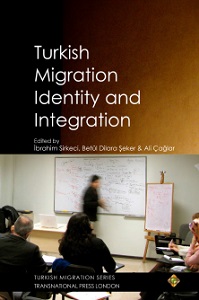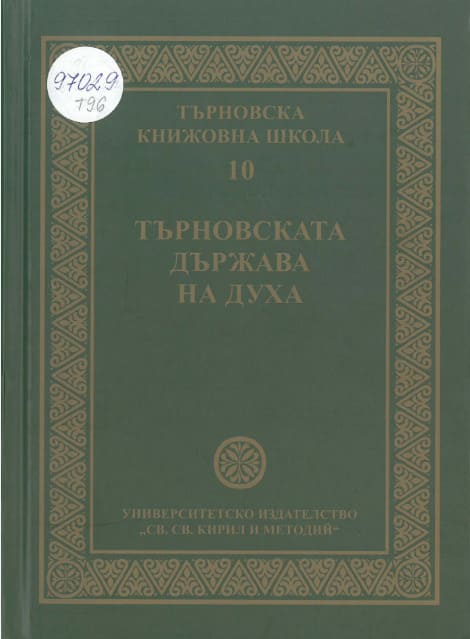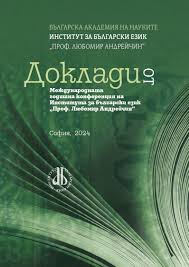
We kindly inform you that, as long as the subject affiliation of our 300.000+ articles is in progress, you might get unsufficient or no results on your third level or second level search. In this case, please broaden your search criteria.


The article treats the means of expression of hesychastic apophaticism, used by Old Bulgarian writers of the 14th – 15th centuries, and the author tries to show that these means are very old, and were characteristic even for the mind of primitive people. He pays attention to the synonymy of ‘aphophatic’ negative pronouns and ‘cataphatic’ summative pronouns; to the pleonastic use of the negative particle не; to the syntactic but- constructions; and to necessative constructions.
More...
The paper is a continuation of the author’s long-term research, in which an attempt was made to collect and classify the ethnocultural lexicon related to the Ethnolinguistic Dictionary of the spiritual and material folk culture of the Bessarabian Bulgarians in Ukraine. The terminology of the culinary lexicon of the Bulgarians in the diaspora is an expression of the national specificity of the culture, and in this sense, its study is prospective within the emerging trends of European thinking from the beginning of the 21st century. The gathered lexical material is formed as a corpus of folk terms related to the culinary lexicon of the Bessarabian Bulgarians.
More...
Based on authentic materials from the Romanian Linguistic Atlas (ALR II s.n.), examples of Romanian words are selected from the semantic field of water, fishing, and fish names. We focus on words of Slavic origin,more specifically, words with a Bulgarian and an Old Bulgarian etymology. Besides their linguo-geographic distribution and their areal properties – such as a wide distribution or limited attestation in the form of a so-called relic island – we examine: What other synonyms with non-Slavic etymologies does the respective word have, and can certain patterns be identified? In addition, we look at the phonetic variability of words and typical word formation processes. Furthermore, we attempt to draw possible conclusions about the region’s historical development. In their unpublished talk of 2016, Dahmen, Popovici conclude that most of the fish names in these areas are of Slavic origin,which testifies to the intensive settlement of Slavs in the lowlands and on the banks of the Danube River, which is supported by archaeological findings. It also confirms the traditional local Bulgarian-Slavic subsistence strategy of fishing. The word roots of many fishing terms are traceable back to the times of the Proto-Slavic homeland, so again we can confirm that fishing was a typical subsistence strategy of native Slavs.
More...
The paper analyzes the semantics, lexicography and main contexts of use of the Bulgarian verb заварвам, with special attention to folklore, rituals and folk speech, on the ground of ethnolinguistic methodology. It also studies the words formed from the same root завареник, завареница (step-children), преварник (a ritual person at a wedding), etc. Synonymic vocabulary with other stems from the Bulgarian dialects (затичам, затечено дете, затичняк), including borrowings (Greek в/фтасам), and the semes that determine the convergence of the lexemes are indicated. The Balkan character of the greeting Добре дошъл – Добре заварил is shown; the ways of further research of the semantics of ‘to catch up’ in Slavic and Balkan languages are outlined
More...
The article examines the antonyms in the field of the concept TOLERANCE. Survey data are analyzed seeking an answer to the question of how the Bulgarians perceive tolerance, whether they accept it as a value. Groups of antonyms united by a common semantic feature are derived, as well as the leading oppositional pairs that build the attitudes of the modern Bulgarians. Nationally specific stereotypical signs of this value-marked concept are revealed.
More...
The article examines the history and usage of a specific type of phraseological units with a component гарван, врана / kruk, wrona (‘raven’, ‘crow’) in Bulgarian and Polish. These phraseological units have a common origin related to the ancient cultural heritage of European nations and initially share a close meaning. However, their development in the two languages takes different paths, leading to the emergence of interlinguistic asymmetry. The conducted research demonstrates that interlinguistic equivalence relationships in phraseology are dynamic and can change over time depending on the characteristics of intra-linguistic developmental processes.
More...
The paper discusses different types of situations in which the possessive group u + genitive is used to encode the subject. In Russian, such a group can be a marker of a wide range of subjects, including possessor (У него две собаки ‘He has two dogs’); experiencer subject of internal states (У меня было чувство/подозрение, что Р ‘I had a feeling/suspicion’), subject of involvement (У нас пожар ‘At our place we have a fire’; У него обыск ‘They conduct a search at his place’; У меня чайник перегорел ‘My kettle got burnt’), agent referent in situations with suppressed or lost control (У меня встреча ‘I have a meeting’; У меня мотор не заводится ‘My motor does not start’). Due to the coding of the subject by the u-group, all such situations receive a pseudo-possessive conceptualization. The Bulgarian correspondences to these Russian constructions have been analysed on the material from the parallel corpus.
More...
As one of the key questions of contrastive phraseology, the question of equivalence arises, i.e. the coincidence of idioms in two or more languages. The present text develops already existing typologies of cross-linguistic phraseological equivalence on the basis of Bulgarian and Croatian phraseology. Structural-semantic equivalences, partially structural equivalences with matching semantics, semantic equivalences, and also null equivalence are defined. The criteria for determining the type of equivalence are: structural, semantic, motivational (background aspect), stylistic and use criteria.
More...
The paper provides an analysis of the evaluative potential of verbal and non-verbal means within the category of evaluation in contemporary Ukrainian internet discourse. These linguistic tools are employed to exert linguistic influence on the audience. Rational and emotional evaluation is integral to the lexical meaning of words,phrases, and sentences, reflecting a positive or negative attitude towards the respective subjects, facts, and events in the surrounding world. The implementation of evaluation at the lexical level is manifested in archaic lexical units with a touch of formality (безсмертя, героїзм), in expressively colored vocabulary (slang, colloquialisms, vulgarisms, abusive words) (запроданець, визискувач), and in neologisms. Maximum influence on the consciousness and behavior of the addressee is achieved through the metaphorical use of words, as secondary nominations impart imagery, expressiveness, emotional content, and originality to texts, attracting the attention of readers. The implication of the author’s subjective evaluation with the aim of shaping a particular attitude towards events and presented information is realized within the specific mass media context through the use of vocabulary which names precedent phenomena, and other linguistic means.
More...
This paper presents the work on compiling a bilingual corpus that demonstrates the syntactic realisation of the conceptual description of verbs in English and Bulgarian and in a broader context, facilitates cross-linguistic studies by providing the foundation for theoretical and practical observations based on the two languages. The compilation of the corpus relies on the universal aspects of conceptual description and syntactic realisation by harnessing the main structural principles of the two main resources employed (WordNet and FrameNet), allowing for cross-linguistic alignment and transfer of information from one language to another (in this case from English to Bulgarian) and between resources, in particular transferring the semantic description from FrameNet onto the verb synsets in WordNet. The resulting resource links the semantic level of the conceptual frames and the frame elements with the syntactic level (couched in the form of patterns representing the syntactic realisation of the frame elements in terms of their syntactic categories and grammatical function).
More...